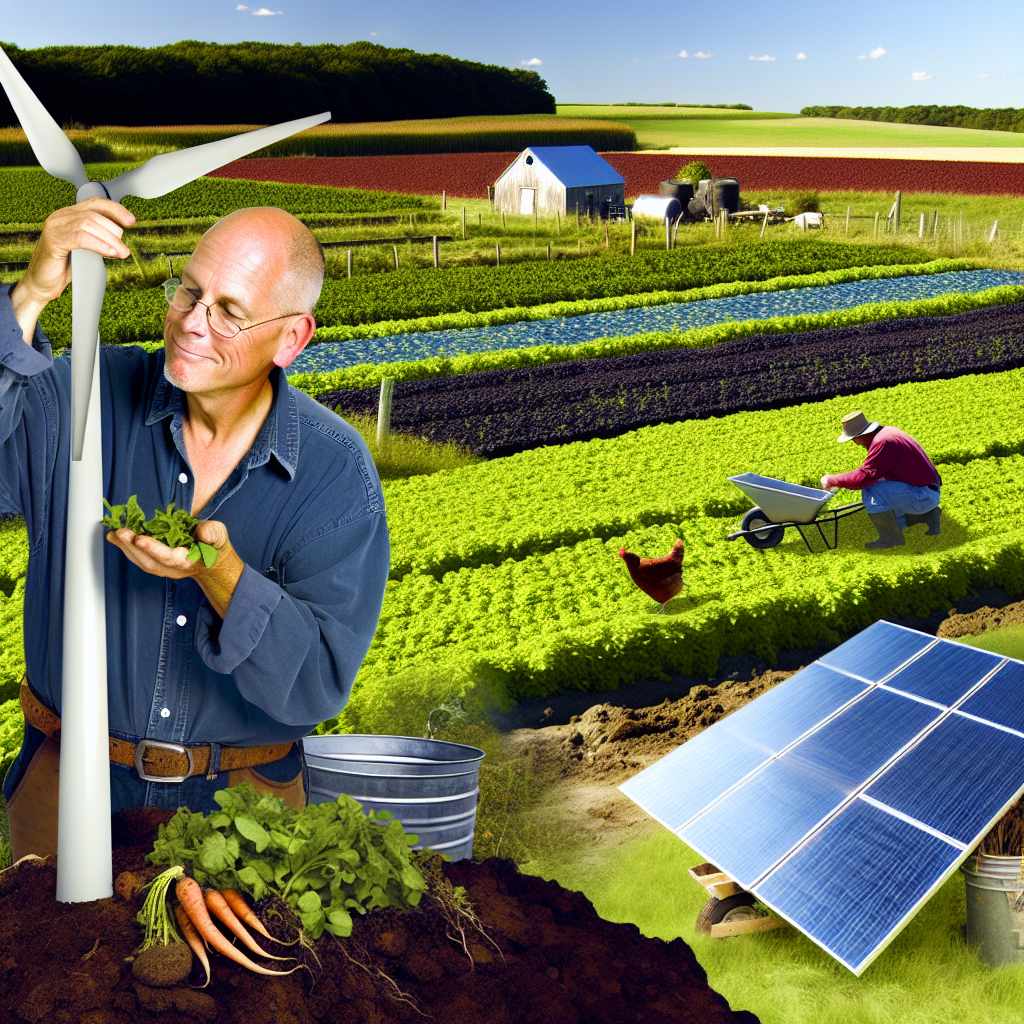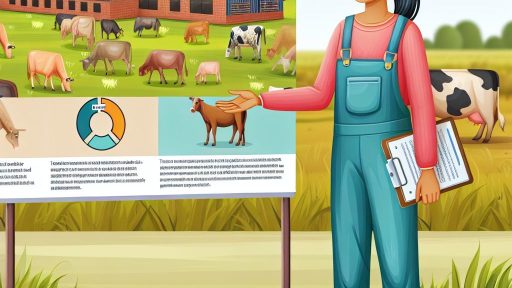Introduction to Renewable Resource Utilization for Small-Scale Farmers
Small-scale farmers play a crucial role in sustainable agriculture.
They contribute to local economies while maintaining environmental integrity.
Utilizing renewable resources can enhance their productivity and profitability.
This approach fosters resilience against climate change and market fluctuations.
Benefits of Renewable Resources
Renewable resources, such as solar and wind, provide sustainable energy options.
These resources reduce dependency on fossil fuels.
Consequently, farmers can lower operational costs significantly.
Moreover, using organic fertilizers promotes soil health and biodiversity.
Implementing Renewable Practices
Farmers can adopt multiple strategies for renewable resource utilization.
For instance, utilizing solar panels for irrigation systems is a practical choice.
This investment reduces electricity costs while conserving water.
Additionally, implementing crop rotation enhances soil fertility.
Community and Education
Education plays a pivotal role in renewable resource utilization.
Farmers can benefit from workshops on sustainable practices.
Networking with local organizations fosters collaboration and resource sharing.
Transform Your Agribusiness
Unlock your farm's potential with expert advice tailored to your needs. Get actionable steps that drive real results.
Get StartedUltimately, knowledge empowers farmers to make informed decisions.
Real-World Examples
Many farmers have successfully integrated renewable practices.
For example, Ana Rodrigues in Portugal utilizes wind energy for her farm.
Her investment has doubled her crop yield and reduced costs.
Similarly, Rajiv Patel in India employs drip irrigation powered by solar energy.
His approach has minimized water wastage and maximized efficiency.
Benefits of Renewable Resources in Small-Scale Farming
Cost Efficiency
Renewable resources substantially reduce operation costs for small-scale farmers.
For instance, solar panels can lower electricity expenses.
Moreover, utilizing wind energy can decrease reliance on non-renewable options.
Consequently, farmers can allocate savings to other critical areas.
Enhanced Sustainability
Using renewable resources enhances the sustainability of farming practices.
This method fosters the conservation of natural ecosystems.
Additionally, it helps maintain soil quality and biodiversity.
Farmers contribute to ecological balance by adopting these practices.
Improved Crop Resilience
Renewable resources can boost crop resilience against climatic challenges.
For example, rainwater harvesting systems support irrigation during dry spells.
Furthermore, integrating sustainable practices increases overall yield stability.
By doing so, farmers protect their livelihoods in unpredictable climates.
New Income Opportunities
Small-scale farmers can explore new income avenues through renewable resources.
They can sell excess energy back to the grid, generating additional revenue.
Moreover, adopting eco-friendly practices attracts environmentally conscious consumers.
Thus, farmers can diversify their income streams effectively.
Community Benefits
Implementing renewable resources fosters community development.
Local farmers can collaborate on projects for shared benefits.
Showcase Your Farming Business
Publish your professional farming services profile on our blog for a one-time fee of $200 and reach a dedicated audience of farmers and agribusiness owners.
Publish Your ProfileThis collaboration boosts regional economic growth and job creation.
Additionally, it encourages knowledge-sharing among farmers.
Types of Renewable Resources Available to Small-Scale Farmers
Solar Energy
Solar energy is a powerful resource for small-scale farmers.
It provides electricity for various farming operations.
Farmers can use solar panels to power irrigation systems.
Additionally, they can run greenhouses and barns with solar energy.
Using solar energy reduces dependence on fossil fuels.
Wind Energy
Wind energy offers another renewable option for farmers.
Small wind turbines can generate electricity on-site.
Farmers can use this energy to power their equipment.
Moreover, wind energy helps decrease energy costs over time.
Farmers in windy areas may benefit the most from this resource.
Biomass
Biomass serves as a versatile renewable resource for agriculture.
Farmers can utilize organic waste to produce energy.
This can include crop residues and animal manure.
Biogas production from these materials enhances sustainability.
Additionally, biomass can improve soil health through composting.
Hydroponics and Aquaponics
Hydroponics and aquaponics are innovative farming methods.
These systems utilize water-efficient processes for crop production.
They can significantly reduce water usage compared to traditional farming.
Hydroponics allows for year-round cultivation of vegetables.
Aquaponics combines fish farming with plant cultivation.
Rainwater Harvesting
Rainwater harvesting helps small-scale farmers conserve water.
Farmers can collect rainwater for irrigation purposes.
This method reduces dependency on municipal water sources.
Additionally, it can help manage stormwater runoff effectively.
Implementing this practice promotes sustainability in farming.
You Might Also Like: Sustainable Beef Cattle Farming Methods for Eco-Friendly Ranching
Solar Energy: Harnessing Power for Irrigation and Electricity
The Role of Solar Energy in Agriculture
Solar energy plays a significant role in modern agriculture.
This renewable resource provides power for various farming operations.
Furthermore, it helps reduce the carbon footprint of farming practices.
Benefits of Solar-Powered Irrigation Systems
Solar-powered irrigation systems offer numerous advantages to small-scale farmers.
They reduce dependence on costly diesel or electric pumps.
Additionally, these systems can operate efficiently in remote locations.
This technology ensures a reliable water supply for crops.
Moreover, farmers experience lower operational costs over time.
Types of Solar Irrigation Systems
- Drip irrigation powered by solar energy.
- Sprinkler systems that utilize solar pumps.
- Surface irrigation enhanced by solar technology.
Using Solar Energy for Electricity
Solar energy can also supply electricity for small farms.
This energy can power equipment such as tractors and processing machines.
Farmers can install solar panels to harness this energy on-site.
Consequently, they reduce their reliance on traditional energy sources.
Showcase Your Farming Business
Publish your professional farming services profile on our blog for a one-time fee of $200 and reach a dedicated audience of farmers and agribusiness owners.
Publish Your ProfileMany farmers report significant savings on their electricity bills.
Implementing Solar Power Systems
Proper planning ensures effective implementation of solar power systems.
Farmers should assess their energy needs before installation.
Additionally, evaluating local solar resources is crucial.
Working with experienced solar providers can streamline the process.
Challenges and Considerations
While solar energy offers various benefits, challenges exist.
Initial costs of solar systems can be significant for small farmers.
Moreover, maintenance and repair require technical knowledge.
Farmers need to consider these factors when adopting solar technology.
Resources for Farmers
- Government grants and subsidies for renewable energy projects.
- Local cooperatives that offer shared solar initiatives.
- Workshops and training on solar technology maintenance.
Discover More: Renewable Resource Utilization to Improve Farm Profitability
Wind Energy: Solutions for Enhanced Farm Operations
Introduction to Wind Energy
Wind energy is a sustainable resource for small-scale farmers.
Small wind turbines can generate electricity with minimal impact.
Farmers can lower their energy costs by harnessing wind energy.
Benefits of Wind Energy for Farmers
Wind energy provides multiple advantages for farm operations.
Firstly, it reduces reliance on traditional power sources.
Secondly, it lowers greenhouse gas emissions significantly.
Thirdly, farmers can benefit from government subsidies and grants.
Installing Wind Turbines on Farms
Choosing the right location is crucial for wind turbine installation.
Turbines should be placed in areas with consistent wind speeds.
Consulting local regulations is also important before installation.
Farmers can partner with specialized companies for setup.
Maintaining Wind Turbines
Regular maintenance ensures optimal performance of wind turbines.
Farmers should inspect the turbines frequently for wear and tear.
Additionally, cleaning the turbine blades enhances efficiency.
Investing in preventive maintenance can save costs in the long run.
Success Stories from Small-Scale Farmers
Several farmers have successfully integrated wind energy.
For instance, Emily Thompson operates a dairy farm using wind power.
Her wind turbine significantly reduced her energy expenses.
Similarly, the Sanchez family has optimized crop production using wind energy.
Future Potential of Wind Energy
The future of wind energy in agriculture looks promising.
Advancements in technology will enhance turbine efficiency.
Moreover, greater public awareness can increase adoption rates.
Lastly, collaboration among farmers can lead to shared resources.
Gain More Insights: Creating a Resilient Food Forest Using Permaculture Practices
Biomass Utilization: Turning Waste into Valuable Resources
Importance of Biomass for Small-Scale Farmers
Biomass offers essential benefits for small-scale farmers.
It turns waste materials into useful products, reducing costs.
This process promotes sustainability by minimizing waste disposal issues.
Types of Biomass Resources
Farmers can utilize various biomass sources for energy and composting.
Agricultural residues, such as stalks and husks, serve as prime examples.
Livestock manure provides another valuable biomass resource.
Showcase Your Farming Business
Publish your professional farming services profile on our blog for a one-time fee of $200 and reach a dedicated audience of farmers and agribusiness owners.
Publish Your ProfileAdditionally, food waste can be converted into nutrient-rich compost.
Methods of Biomass Conversion
Farmers can adopt several methods to convert biomass into valuable resources.
Composting is a straightforward process that enriches the soil.
Anaerobic digestion generates biogas from organic waste materials.
Heating biomass through gasification transforms it into a combustible gas.
Finally, pyrolysis creates biochar, which enhances soil fertility.
Benefits of Biomass Utilization
Utilizing biomass leads to several positive impacts for farmers.
First, it reduces waste and promotes a cleaner environment.
Second, it decreases dependence on chemical fertilizers.
Third, biomass utilization can generate alternative energy sources.
Consequently, farmers can reduce their energy costs significantly.
Challenges and Considerations
Despite its benefits, biomass utilization has challenges.
Farmers must invest in equipment to efficiently process biomass.
Additionally, understanding the balancing ratios is crucial for effective practices.
Farmers should also be aware of local regulations surrounding waste processing.
Ultimately, thorough planning ensures the successful integration of biomass strategies.
Explore Further: The Impact of Precision Agriculture on Soil Erosion and Conservation

Water Conservation and Rainwater Harvesting Techniques
Importance of Water Conservation
Water conservation is crucial for sustainable agriculture.
It helps farmers reduce costs while preserving natural resources.
Moreover, conserving water enhances crop productivity.
Effective Water Management Practices
Implementing effective water management practices can significantly impact yields.
Farmers should consider different techniques for maximizing water use.
For instance, using drip irrigation minimizes water waste.
This method delivers water directly to plant roots.
Thus, it encourages deeper root growth and resilience.
Rainwater Harvesting Techniques
Rainwater harvesting systems offer a reliable water source.
Farmers can collect and store rainwater for later use.
This technique reduces dependence on groundwater and municipal sources.
Simple Harvesting Systems
Simple rainwater harvesting systems are cost-effective and easy to implement.
Farmers can use gutters connected to storage tanks.
It’s essential to maintain cleanliness to avoid contamination.
Advanced Harvesting Solutions
Advanced rainwater harvesting solutions involve larger-scale systems.
These can include underground cisterns and filtration systems.
These systems provide more significant storage capacity and efficiency.
Soil Health and Water Retention
Maintaining soil health improves water retention capabilities.
Planting cover crops enhances soil structure and reduces erosion.
Furthermore, incorporating organic matter boosts soil moisture levels.
Community Engagement and Education
Engaging communities can amplify water conservation efforts.
Farmers should share knowledge about effective techniques.
Also, local workshops can foster collaboration and innovation.
Showcase Your Farming Business
Publish your professional farming services profile on our blog for a one-time fee of $200 and reach a dedicated audience of farmers and agribusiness owners.
Publish Your ProfileUltimately, informed farmers make better water management decisions.
Government Policies and Support for Sustainable Farming Practices
Overview of Current Policies
The government actively promotes sustainable farming practices.
Recent policies focus on renewable resource utilization.
These initiatives aim to support small-scale farmers.
Additionally, they encourage eco-friendly methods.
Incentives for Small-Scale Farmers
Financial incentives are available for adopting sustainable practices.
Grants and subsidies help farmers implement green technologies.
For example, the Rural Energy for America Program offers assistance.
This program aids in the purchase of renewable energy systems.
Training and Resources
Extension services provide valuable training for farmers.
Workshops on sustainable agriculture are widely accessible.
These resources teach effective management practices.
Moreover, they promote soil conservation techniques.
Environmental Regulations
Strict environmental regulations enhance sustainable farming.
Farmers must adhere to guidelines that protect natural resources.
These regulations target soil and water conservation efforts.
Compliance ensures healthier ecosystems and sustainable productivity.
Collaborations with Non-Governmental Organizations
Government agencies collaborate with NGOs for better outreach.
These partnerships drive community involvement in sustainability.
NGOs offer unique insights into local farming challenges.
By working together, they create effective solutions.
Impact of Policies on Local Communities
Local communities benefit from sustainable farming policies.
These policies boost local economies and employment.
Furthermore, they enhance community health through better food access.
Ultimately, sustainable practices promote overall well-being.
Case Studies of Successful Implementation of Renewable Resources
Solar Energy in Agriculture
Many small-scale farmers have successfully adopted solar energy systems.
These systems provide reliable power for irrigation and equipment.
For instance, Maria Gonzalez from California installed solar panels on her farm.
This installation reduced her energy costs significantly.
Consequently, she could reinvest those savings into crop production.
Additionally, solar energy increased her operational efficiency.
Wind Energy Utilization
Wind energy has proven beneficial for farmers in several regions.
A notable example is James Tarleton from Texas.
James implemented a small wind turbine on his property.
This turbine generates energy to power his barn and irrigation systems.
Through this initiative, he decreased reliance on the grid.
Furthermore, this approach helped him earn additional income by selling excess energy.
Biodiesel Production
Some farmers are turning to biodiesel as a renewable resource.
Susan Martin from Iowa produces biodiesel from used cooking oil.
She uses this biodiesel to fuel her tractors and other equipment.
Showcase Your Farming Business
Publish your professional farming services profile on our blog for a one-time fee of $200 and reach a dedicated audience of farmers and agribusiness owners.
Publish Your ProfileThis move has led to substantial savings in fuel costs.
Moreover, Susan actively participates in local biodiesel cooperatives.
These cooperatives are essential for broader community adoption.
Organic Waste Management and Biogas
Organic waste management is gaining traction among small-scale farmers.
For example, Ravi Patel from Indiana utilizes biogas systems.
Through anaerobic digestion, he converts livestock waste into biogas.
This biogas provides energy for heating and cooking on his farm.
Additionally, the leftover digestate serves as a nutrient-rich fertilizer.
Thus, this method effectively closes the nutrient loop on his farm.
Implications of Renewable Resource Practices
These case studies illustrate the effectiveness of renewable resources.
Each farmer showcases unique methods tailored to their specific needs.
Adopting these practices enhances sustainability and resilience.
Ultimately, such initiatives cultivate environmental stewardship and economic viability.
Challenges and Solutions in Adopting Renewable Resources
Understanding the Barriers
Many small-scale farmers face financial constraints.
Limited access to capital often prevents them from investing in renewable technologies.
Additionally, farmers may lack knowledge about available energy options.
The complexity of installation processes can discourage adoption.
Furthermore, local regulations may not support renewable resource usage.
Improving Financial Accessibility
Financial institutions can offer green loans specifically for farmers.
These loans should have flexible repayment plans designed for seasonal income.
Government grants can also help cover upfront costs for renewable installations.
Partnerships with local cooperatives may provide pooled resources for investment.
Training programs can educate farmers about accessing financial support.
Enhancing Education and Awareness
Community workshops can help farmers understand renewable energy benefits.
Moreover, online resources can provide accessible information on implementation.
Collaboration with agricultural extension services may spread best practices.
Local success stories can inspire other farmers to explore renewable options.
Outreach initiatives can improve overall awareness of sustainable practices.
Simplifying Installation Processes
Manufacturers can create user-friendly renewable energy systems.
Turnkey solutions can minimize installation complexity for farmers.
Training sessions from suppliers can empower local technicians to assist farmers.
Support networks can provide ongoing assistance after installation.
Standardizing installation practices can improve efficiency and reliability.
Advocating for Supportive Policies
Farmers should advocate for policies favoring renewable energy development.
Local governments can create incentives for adopting sustainable practices.
Engagement with policymakers can ensure farmers’ voices are heard.
Moreover, cooperative lobbying can strengthen the push for regulatory changes.
Creating a framework for renewable resource support can benefit the agricultural community.
Additional Resources
Combat Food Waste with Sustainable Agriculture & Farming | Shapiro
Adaptation of resilient regenerative agricultural practices by small …
Showcase Your Farming Business
Publish your professional farming services profile on our blog for a one-time fee of $200 and reach a dedicated audience of farmers and agribusiness owners.
Publish Your Profile



